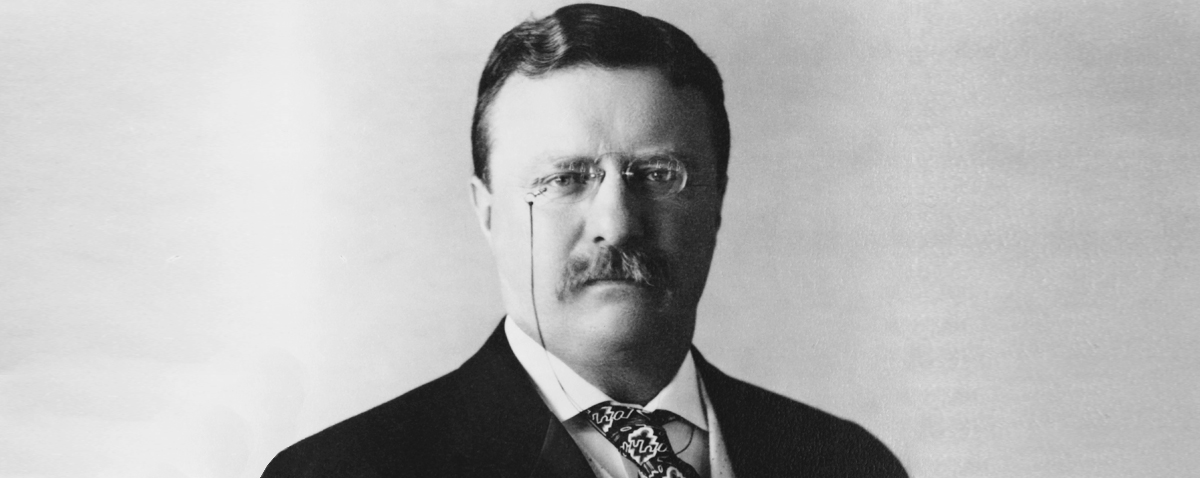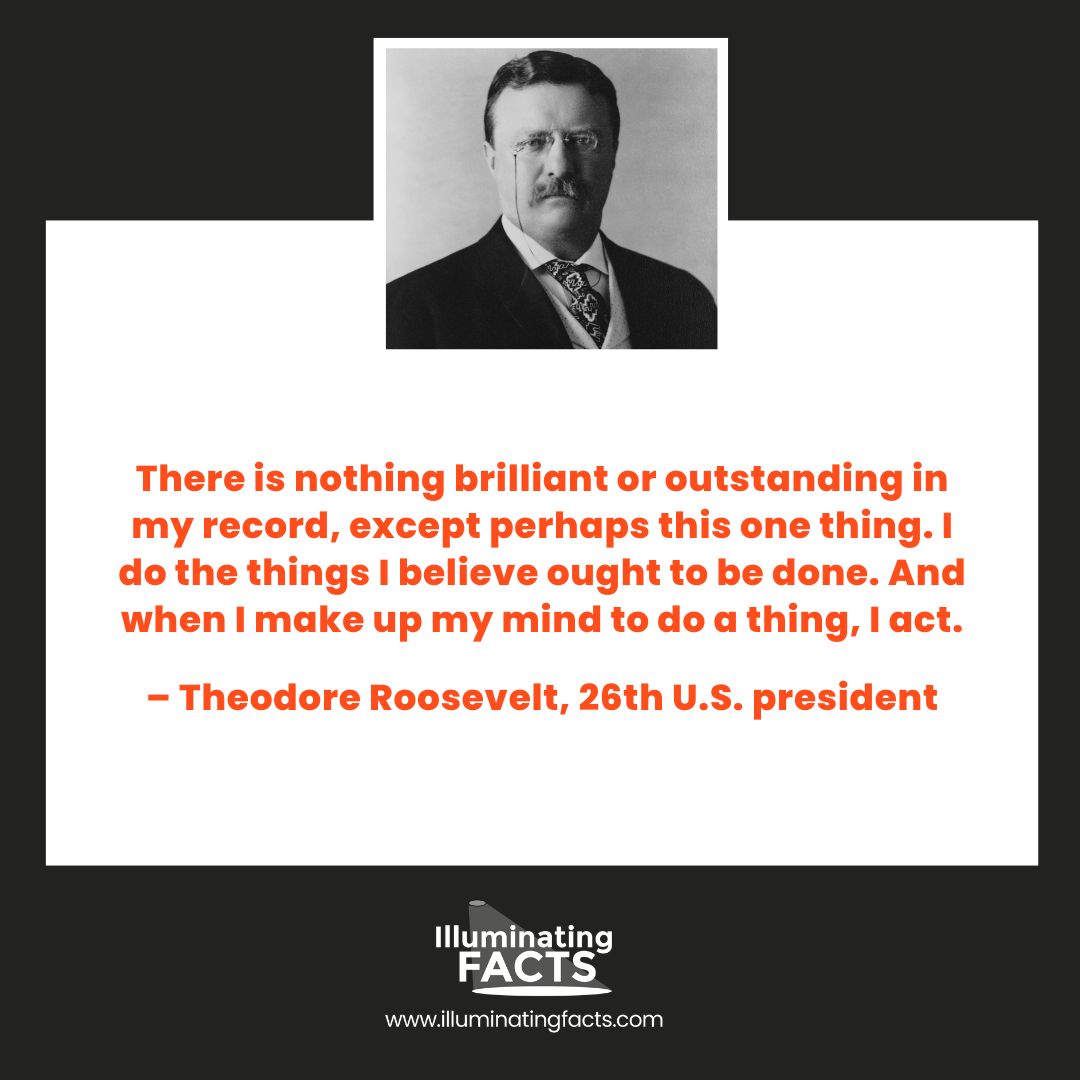Humans as we are, we take pride in our successes, big or small. We post on social media, we celebrate, and we reward ourselves in whatever way we imagine. For Theodore Roosevelt, having been born into an affluent family, yet frail in health; it seemed that he did not think much about success, instead he focused on whatever he committed to do, while he can, to the best of his ability.
Who was Theodore Roosevelt?
When you google “the youngest president of the United States,” the answer will be Theodore Roosevelt, age 42 [1]. Theodore Roosevelt, a Republican was serving as the 25th Vice-President when President William McKinley was assassinated. He then assumed office as the 26th president of the United States. He won his second term during the United States presidential election on November 8, 1904 [2]. He was the US President from 1901 to 1909.
He said:
“there is nothing brilliant or outstanding in my record, except perhaps this one thing. I do the things I believe ought to be done. And when I make up my mind to do a thing, I act”.
At Mount Rushmore in South Dakota’s Black Hills National Forest, the gigantic sculpture of President Theodore Roosevelt is carved together with great U.S. Presidents Abraham Lincoln, Thomas Jefferson, and George Washington [3].
The context of the quote
With all his achievements, the readers may say that the line ‘there is nothing brilliant or outstanding in my record’ is an understatement. In a wider perspective, to know Theodore Roosevelt’s life will make readers understand and relate to this quote.
Theodore Roosevelt’s biography will tell an amazing man who had shares of traumatic events. He suffered from illnesses such as repeated fever, colds, gastroenteritis, and asthma. His devoted mother and his beloved wife died on the same day. His first daughter was born on the day that his wife he fondly called “my light” died. His beloved youngest son died before him. He survived an attempted assassination. He had heart ailment. He had defeats.
Yet, he did great deeds! His interest in many fields showed his intellectual prowess. His father told him:
“You have the mind, but you have not the body, and without the help of the body the mind cannot go as far as it should. You must make your body [4].”
So, as a young man, Theodore Roosevelt did not focus on his pains, he decided to live a strenuous life. He undertook a program in gymnastics and weightlifting. He saw to it that he has time for physical agility like hiking, riding horses, and swimming. Their family travels shaped his cosmopolitan life. He graduated Magna Cum Laude from Harvard University. He served in the military as a “Rough Rider.” He was known as a “trust buster” for his work to end large corporate monopolies and ensure the rights of the common working man. He was instrumental in negotiating the construction of the Panama Canal. He had many other notable accomplishments.
Indeed, this quote is an understatement… for a very valid reason. He views his good deeds as opportunities to be of service. He is a man who defeated hindrances with determination to use his potential to help make the world a better place.
Take Action
‘…except perhaps this one thing. I do the things I believe ought to be done. And when I make up my mind to do a thing, I act’ compose more than one thing: do, believe, make up, act. These are four powerful words that sum up to ACT.
The quote means to take action. This is better expressed in ‘The Strenuous Life’ speech he delivered in Chicago, Illinois, on April 10, 1899, when he was a New York Governor which says:
In speaking to you, men of the greatest city of the West, men of the State which gave to the country Lincoln and Grant, men who pre-eminently and distinctly embody all that is most American in the American character, I wish to preach, not the doctrine of ignoble ease, but the doctrine of the strenuous life, the life of toil and effort, of labor and strife; to preach that highest form of success which comes, not to the man who desires mere easy peace, but to the man who does not shrink from danger, from hardship, or from bitter toil, and who out of these wins the splendid ultimate triumph [5] .’
The history of the quote
President Theodore Roosevelt spoke these words in 1909 to Oscar King Davis. Oscar King Davis was a senior correspondent for the New York Times. He was a trusted journalist of the president.
This quote expressed how President Theodore Roosevelt regarded himself as an average man with an above average work ethic and will to excel. These words were published posthumously in 1925 [6].
Why its a famous quote
It is a famous quote because it is from a man who left gems of thoughts for people to take courage from. It is uttered when a person feels so inadequate and yet believes that he can do something great. With determined action, everything is possible.
Conclusion
The quote encompasses the legendary approach to life of a larger than life American President. He was a man of action who knew what he wanted, and he acted to get his visions done. He did not think much of success or fame, it just resulted from his passion to achieve his goals. He pursued life like each day was his last that ushered him to win the stern strife of actual life. This quote is for us to take courage to defy the boundaries that we may be in at the moment.
References:
[1] List of presidents of the United States by age. (2022, September 18). In Wikipedia. https://en.wikipedia.org/wiki/List_of_presidents_of_the_United_States_by_age [Accessed September 19, 2022]
[2] United States presidential election of 1904. (2011, October 3). In Britannica.
https://www.britannica.com/event/United-States-presidential-election-of-1904 [Accessed September 19, 2022]
[3] Why these four presidents. 2022, May 23). In National Park Service. https://www.nps.gov/moru/learn/historyculture/why-these-four-presidents.htm [Accessed September 19, 2022]
[4] The Mind but not the Body, Chapter 2. In Erenow. https://erenow.net/modern/theodoreroosevelt/3.php [Accessed September 19, 2022]
[5] The Strenuous Life. (2022, August 24). In Wikipedia. https://en.wikipedia.org/wiki/The_Strenuous_Life [Accessed September 19, 2022]
[6] Theodore Roosevelt Quotes. In Theodore Roosevelt Center.
https://www.theodorerooseveltcenter.org/Learn-About-TR/TR-Quotes?page=40 [Accessed September 20, 2022]


